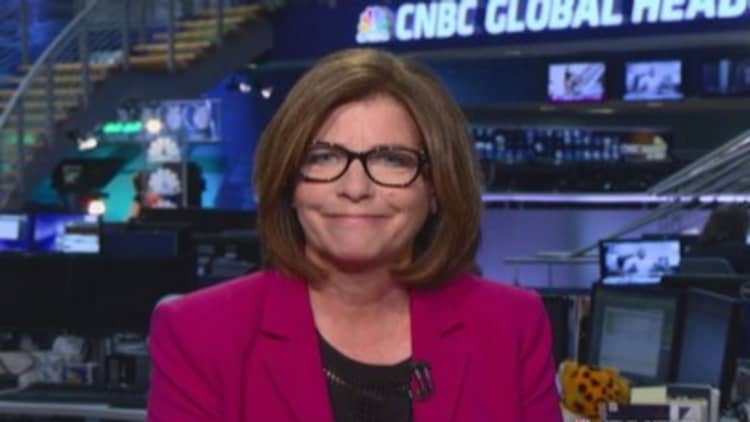
Stock market volatility could continue to be somewhat elevated, particularly for small cap names, as earnings season gets underway.
Earnings season is seen as the next catalyst for the market, and strategists mostly expect a decent quarter with estimated gains of about six percent for S&P 500 earnings. But companies' outlooks could make or break the market's stride.
"In the first quarter, we thought earnings estimates were clearly too low and the second quarter was no problem. I still think the second quarter is not a problem but the second half has 11 percent estimated EPS (earnings per share) growth. It's going to be harder to achieve," said Steven Wieting, global chief strategist at Citi Private Bank.
Wells Fargo is the first of the major banks to report earnings Friday morning, and traders say Wells needs to make its numbers or the market could get spooked before both the weekend and next week's heavy calendar of financial earnings. Wells is not expected to post a big decline like J.P. Morgan, Citigroup and Bank of America, which are expected to show steep earnings declines.
"That's the one everybody's hanging their hat on. It's going to be the outperformer," said one trader.
Stocks sold off Thursday in one of the most turbulent sessions in two months on concerns about the global economy. Global markets began reacting overnight to a string of weaker data and on reports of trouble at a Portuguese financial institution.
Read MoreEarlier selloff masks real concern for stocks
The was down 180 points at the open Thursday, but recovered to close just 70 points lower at 16,915 in its biggest one-day reversal in 13 months. The S&P 500 ended the day down 8 at 1964. But the was off more than 1 percent at 1161, giving it a decline of 3.8 percent so far for the week and potentially its worst weekly decline in two years.
Steve Massocca of Wedbush Securities said the selling may not carry through. "We're technically in need of a correction. Fundamentally, we're in a need of a correction. The one thing giving me pause is the reason we got a sell off today wasn't really that negative. If it was something that had a little more meat in here, I'd say absolutely," he said.
High valuations in momentum names, and small caps could continue to be a concern, he said. "Stocks are expensive. It doesn't take much to cause issues," he said. "I would not say they are overpriced but they (aren't) cheap and some stocks are stupid expensive. These patches of overvaluation are a concern." He pointed to momentum names like Tesla, Baidu, and Amazon.
Read MoreThe end of QE will cause 15-20% correction: Expert
Credit Suisse strategist Lori Calvasina says more pain could be ahead in the small cap universe, which is priced at 18 to 19 times forward earnings. "We have not at any time this year made any significant dent in the overvaluation problem we came into 2014 with…I think it will be resolved by year end," she said.
Scott Redler, who follows the market's short-term technicals at T3Live.com, said the Russell may be providing a warning for the broader market. "I think the Russell gave you some clues that volatility was going to pick up this week. Today's bounce – just because of how fast it went down – is not a sign that it's over," he said.
Redler follows the IWM, the iShares Russell 2000 ETF and said he is watching to see if it will hold 114, its 50-day moving average. "When you hit moving averages for the first time, you can hold them. Considering how far it dropped in the last few days, the question is - Can it hold?"
Read MoreHere are safety plays for today's market, pros say
Calvasina said investors are exiting small caps, and funds are showing outflows. That could put more pressure on the sector, and earnings season will be a challenge. "If the earnings don't come through, I think you're going to see reactions," she said.
Wieting said the market was overdue for a sell off , and while it's not clear it will continue, he noted that the market over the course of 20 years corrected about twice as much in the third quarter, or 40 percent of the time, as in the fourth quarter. "The third quarter is the only quarter for global equities that averages a negative return…It tends to be a more volatile, risk adverse period."
He said the market's overreaction Thursday morning was a direct result of its over complacency.
"The market has been remarkably calm and priced for a future that is less volatile than history suggests," said Wieting.
—By CNBC's Patti Domm


